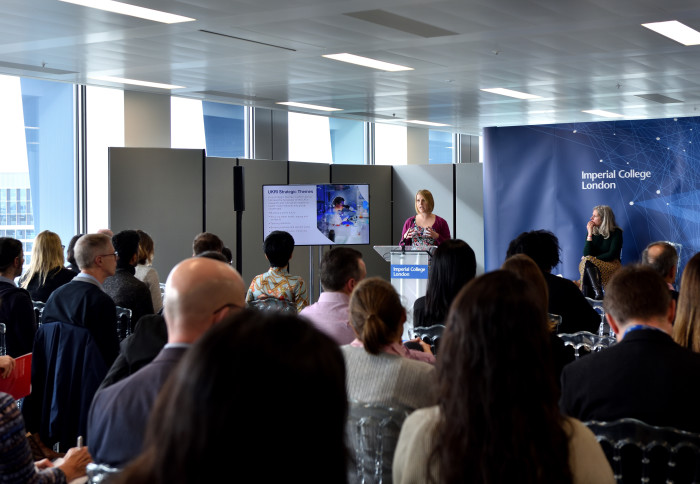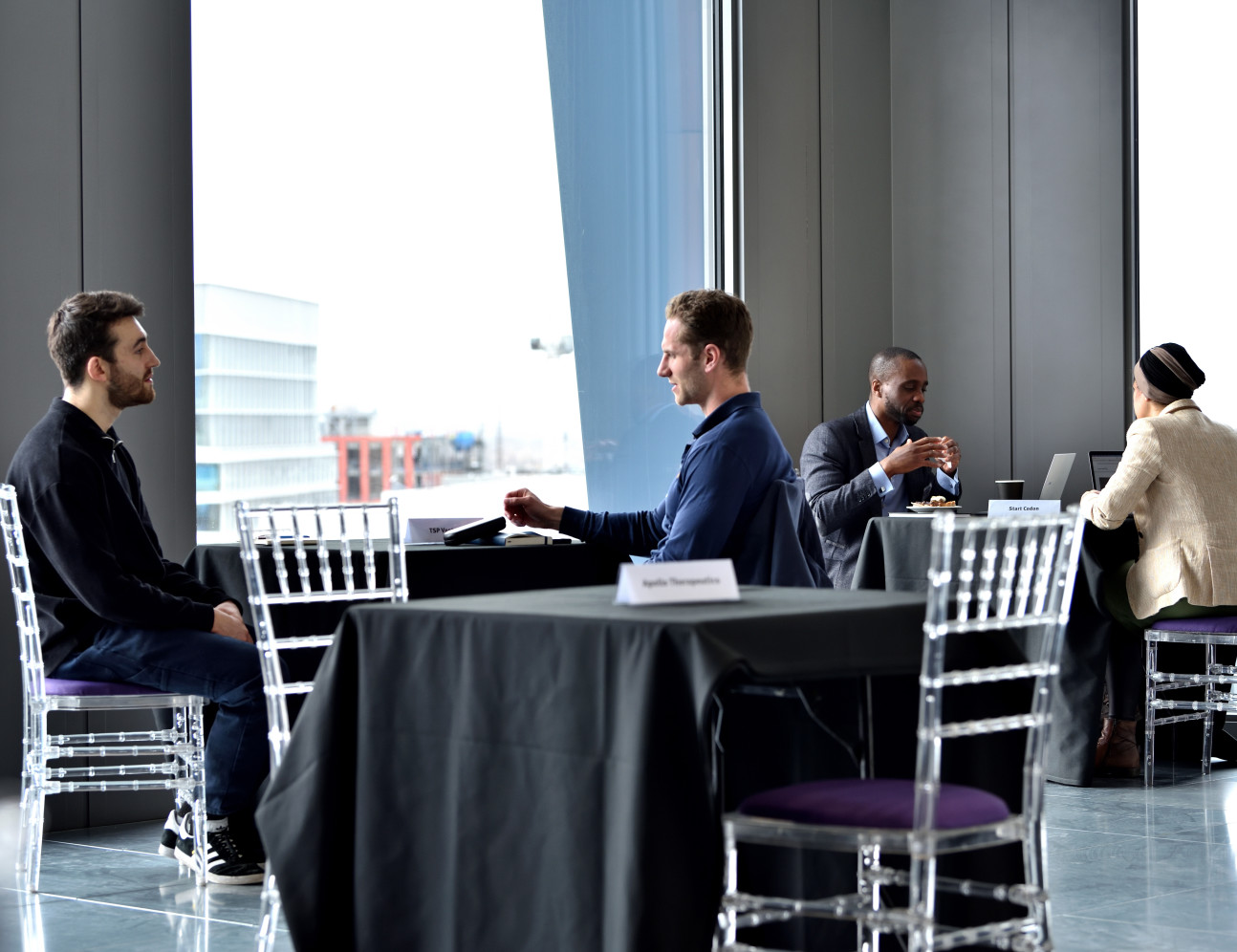Translational support for impact on show at All You Can Innovate 2023
by Gavin Reed

Professor Thrishantha Nanayakkara has a vision for palm tree farmers – a technology-enabled approach to precision agriculture and harvesting.
Palm trees are economically significant in many countries worldwide due to agricultural production. Red Palm Weevil (RPW), designated a global threat by the UN FAO, and the fact that palm trees rarely grow to their full potential are major challenges for farmers of this important species. Beginning with the goal of supporting farmers in eradicating RPW, Professor Nanayakkara (Dyson School of Design Engineering) has rapidly iterated a series of technologies that deliver sensing and monitoring of tree health to growers through his company, Permia Sensing.
The initial work that backed Permia was funded by a UKRI Impact Acceleration Account (IAA) grant. It allowed the Permia team to further explore some existing work and build a strategy to translate it into practice. And that’s what Thrishantha and his team have done, developing an early prototype sensor into a remote monitoring solution supported by a digital dashboard, than can give precise information on tree health to growers, enabling better performing farms.
Speaking on Thursday 23rd of March to an audience of Imperial researchers, industry partners and investors at All You Can Innovate (AYCI23), Professor Nanayakkara praised the ecosystem at Imperial as an enabler and supporter of this work. Not only did the IAA grant fund key technology developments, but the environment around Imperial provided encouragement and concrete support. Closing his remarks, the Professor said, “without Imperial, none of this would have happened.”
All You Can Innovate 2023
All You Can Innovate returned to Imperial’s White City Campus (this/last week) after a pandemic pause in recent years. Successfully pioneered within the Faculty of Medicine, All You Can Innovate has now expanded in scope to cover all of Imperial’s faculties. Researchers, industry partners, investors and researcher funders convened in Imperial’s I-HUB to exchange ideas, make connections and build relationships with the aim of translating research and delivering impact.
Following an introduction from Dr Simon Hepworth, Director of Imperial Enterprise, delegates heard from key partners across the UK’s translation and innovation landscape, who provided insights on best practice and the potential of translational support to unlock impact.
Speakers from MRC, Apollo Therapeutics and LifeArc offered a glimpse of the widespread and multifaceted support available for translation through multiple routes: translational funding, collaboration and investment.
Partner insights
Dr Richard Butt, Chief Scientific Officer of Apollo Therapeutics, presented on their unique model of applying drug discovery and development expertise to university research discoveries. Apollo is partnered with Imperial, the University of Cambridge, King’s College London, UCL and the Institute of Cancer Research, and develops therapeutic programmes based on discoveries made by researchers at those institutions. Apollo’s collaborations with Imperial since 2016 have progressed numerous projects towards the clinic, with two programmes now close to commencing phase I trials and a healthy pipeline from Imperial active in earlier in drug discovery.
Sohaib Mir, Senior Investment Principal at LifeArc Ventures, delivered a snappy session focused on avoiding pitfalls and gaining traction with potential investors. LifeArc is a self-funded medical charity with a venture capital team that invests in healthcare companies at seed and Series A. Sohaib, originally a medical doctor by training, told delegates about the importance of good storytelling, clearly identifying the unique aspects of an idea, and how essential a strong team is.
A clear lesson from the morning presentation sessions was the fact that successful translational activities are long term, often require a great deal of patience, and benefit from open access and collaboration. Imperial has worked to support this through ecosystem development and convening partners – the White City Innovation District is a key example.
Impact Acceleration Accounts
Professors Julie McCann, Vice-Dean of Research, Faculty of Engineering and Graham Cooke, Vice-Dean of Research, Faculty of Medicine, led an introduction to Imperial’s Impact Acceleration Account, which has recently opened its third call for applications. The IAA is part of UKRI’s portfolio of translational funding support, designed to bridge the gap between discovery and translational needs.
Imperial has aligned its IAA funds to its core academic strategy, and is currently receiving applications for work in Smart, Resilient, Healthy and Sustainable themes. These themes will be applied broadly and inclusively in order to support a breadth of activities to make use of funding in flexible, responsive and creative ways.
Further information on the IAA, which is open for applications until 25 April, is available from the College website.
Funds create outsized effects
Alongside Professor Nanayakarra, Imperial researchers from a range of disciplines spoke about their experiences in translation, revealing the significant difference that well-applied translational funding can make.
Professor Charles Coombes spoke about the importance of translational funding (at the time, ICIC, a precursor to IAA) to the development of samuraciclib, a CDK7 inhibitor and potential therapeutic for hormone receptor positive breast cancer. Following clinical research that identified CDK7 as a potent activator of oestrogen receptors, ICIC funding enabled a collaborative discovery programme that used in silico screening to design a range of promising compounds. Ultimately, following initial publication in 2000, this technology was licensed to a VC-backed biotech company in 2016 and is currently undergoing clinical trials, having been fast-tracked by the FDA.
Dr Aidan Rhodes, of the Energy Futures Lab, spoke about his group’s experience using the IAA to develop a series of energy briefing papers aimed at influencing industry and policy-makers. These papers have been downloaded thousands of times and generated widespread media coverage, created engagement with policy-makers and led to further research funding.
Building relationships
Throughout the day, Imperial Enterprise organised collaboration speed-dating sessions, enabling researchers to meet with industry partners and rapidly explore opportunities. Over 100 meetings took place, providing insights for partners into the work going on at Imperial and a chance for researchers to learn more about industry problems and priorities.
 “Events like All You Can Innovate are about connections and conversations,” said Dr Simon Hepworth, Director of Imperial Enterprise. “Bringing together stakeholders like this is a fantastic way to uncover or create opportunities, and ultimately to make an impact. I am grateful to everyone who took time to make this event a success. Hearing examples from impact-makers in our community who have been enabled by translational funding and the ecosystem is energising, and I hope today was the start of many more such journeys.”
“Events like All You Can Innovate are about connections and conversations,” said Dr Simon Hepworth, Director of Imperial Enterprise. “Bringing together stakeholders like this is a fantastic way to uncover or create opportunities, and ultimately to make an impact. I am grateful to everyone who took time to make this event a success. Hearing examples from impact-makers in our community who have been enabled by translational funding and the ecosystem is energising, and I hope today was the start of many more such journeys.”
To keep up to date with events, news and opportunities to engage with Imperial Enterprise, sign up to our regular newsletter.
Article text (excluding photos or graphics) © Imperial College London.
Photos and graphics subject to third party copyright used with permission or © Imperial College London.
Reporter
Gavin Reed
Enterprise